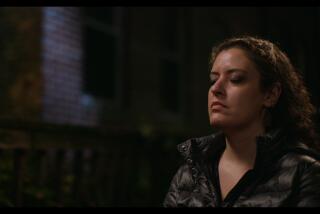‘Cursing at the Sun’ Sheds Light on Mental Illness
- Share via
A homeless man with schizophrenia describes how he wakes up every day “cursingat the sun.” His phrase became the title of Petra Brando’s one-hour documentary on the plight of mentally ill people, which airs today and Sunday on KCET. “Cursing at the Sun” is an intelligent if unpolished look at how our system fails to care for people who have chemical imbalances in their brains.
Petra Brando, the daughter of Marlon Brando, had her first experience with mental illness when her sister Cheyenne was diagnosed with schizophrenia. Watching Cheyenne struggle (she would eventually commit suicide), Petra learned much about the suffering experienced by the mentally ill. She also learned firsthand about the pain that families endure as someone they love spirals down into the dark. Her interest in mental illness deepened during her stint as a law student at USC, and she made this documentary, directed by childhood friends Michael and Jennifer Carroll, for her final exam.
*
One of the first things we learn in the documentary is about how progressive-sounding legislation played a hand in the current plight of the mentally ill. In 1967, a California law (other states have similar laws) decreed that mentally ill people could not be detained against their will unless they posed a danger to themselves or to others or were gravely disabled. Over the years, large institutions were shut down in favor of halfway houses and other community-based options--but those options were never adequately realized.
People living with mental illness--from actress Margot Kidder, diagnosed with manic depression, to men and women living out on the streets--describe their experiences. We also hear from doctors, family members, advocates for the mentally ill, law enforcers, hospital administrators and community workers.
A visit to a state hospital, with its footage of long, drab corridors and a room where patients are restrained when they get violent, reinforces the “One Flew Over the Cuckoo’s Nest” stereotype of such institutions. But a meander past makeshift shacks on Los Angeles’ skid row and homeless and hopeless-looking men and women, shows us some of what society has provided as an alternative.
None of the people appearing in “Cursing at the Sun” have easy solutions to offer. Balancing patients’ civil rights and their need for treatment, which is often refused, is a delicate matter, and folks in the documentary offer sharply contrasting views. While the subject of the documentary is important, the final product drags at times and could do with a stronger narrative and more cohesion.
The last part of the hour explores a local attempt to make a difference: the nonprofit Los Angeles Men’s Place. Volunteers, some of whom have had their own struggle with mental illness, comb the streets, forging respectful contacts with the mentally ill homeless, offering them food, a place to hang, help getting back on their feet, and beds at night--beds for 20 people. And that is just a drop in the ocean.
* “Cursing at the Sun” can be seen tonight at 8 and Sunday at 6 p.m. on KCET.


